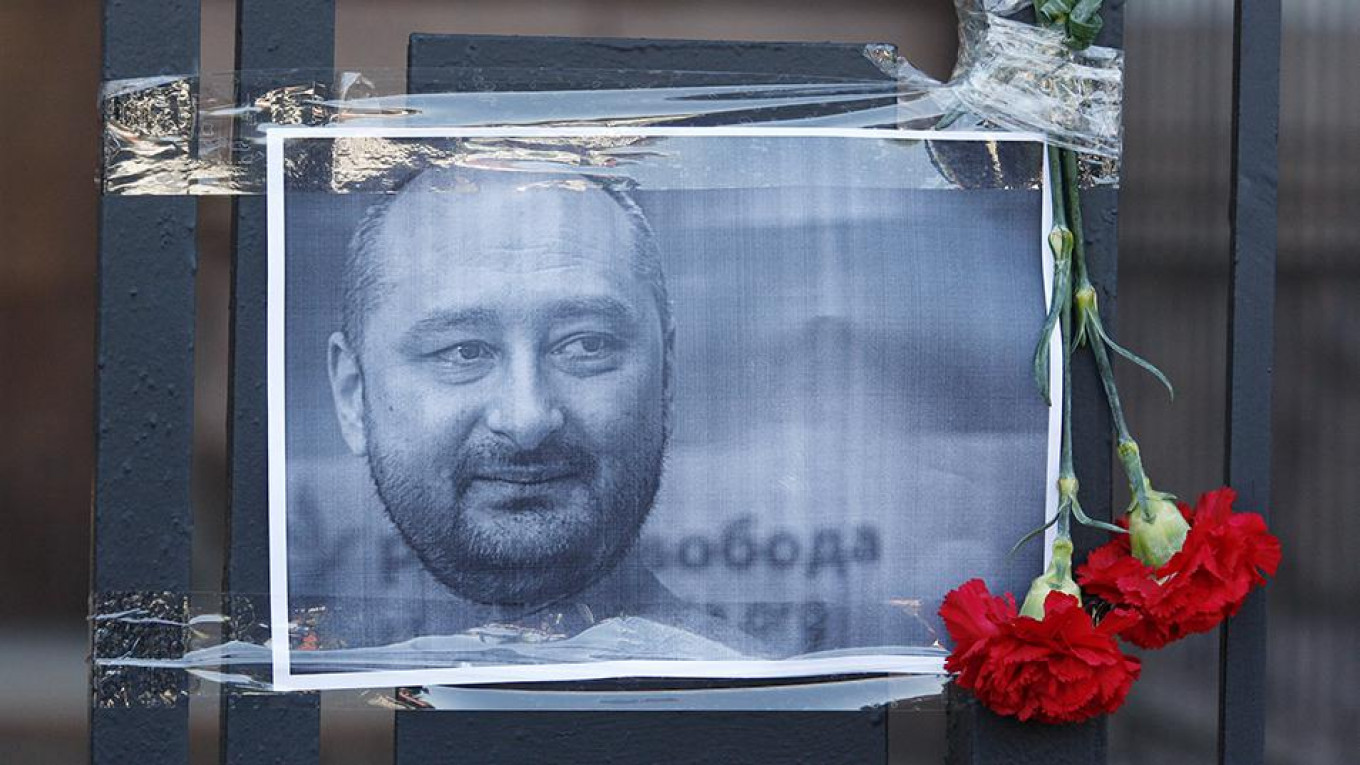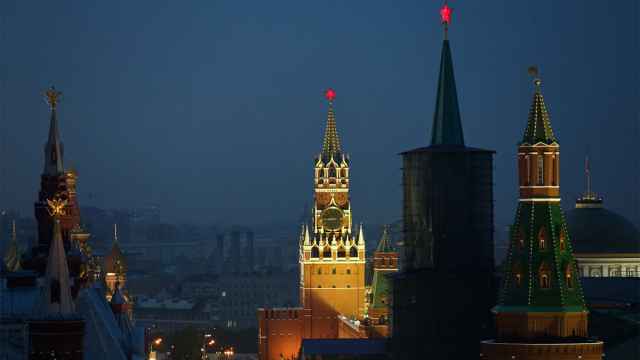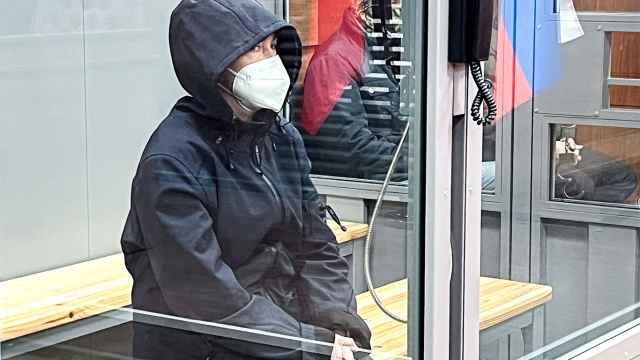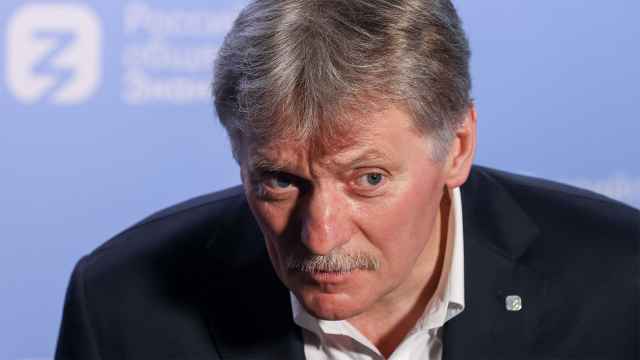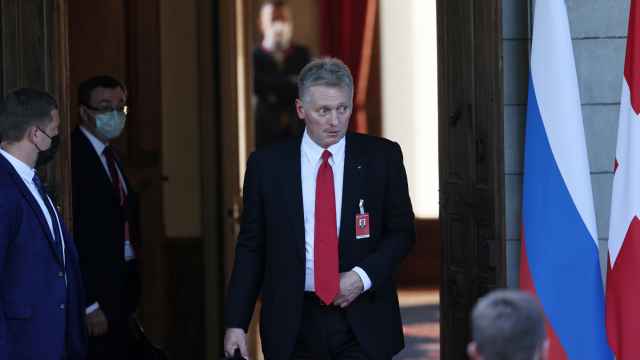Editor's note: Since the publication of this article, Arkady Babchenko has appeared at a press conference in Kiev where he said his murder was staged as part of a sting operation to prevent an actual attempt on his life. Read more.
Another dead critic of the Kremlin. Another round of knee-jerk accusations and denials. Another funeral.
Does the Putin regime murder its enemies as a matter of policy, does it simply create an atmosphere permissive of such violence, or is it now the scapegoat of choice? The answer, of course, is all three — but what may seem an advantage viewed through the distorting windows of the Kremlin is actually another sad step in the country’s slide into pariah status.
Arkady Babchenko’s murder, shot in the back in his stairwell on Tuesday in a manner chillingly reminiscent of the killing of Anna Politkovskaya in 2006, is only the most recent in a series of silencing of anti-Putin voices in Kiev.
It takes place against the backdrop not just of other political murders but also a wider campaign of terrorism carried out, almost certainly, by Russians and their assets against Ukrainian security officers.
It is thus unsurprising that the Ukrainian government instantly blamed Moscow. Prime Minister Volodymyr Groysman asserted that “the Russian totalitarian machine did not forgive [Babchenko] his honesty and principled stance,” describing him as someone who “told the world the truth about Russian aggression.”
Of course, the Russian Foreign Ministry responded in kind, implying that the Ukrainians themselves were implicated. “Bloody crimes and total impunity have become routine for the Kiev regime,” it said.
It is certainly true that Kiev has a tendency to blame Moscow for a range of incidents, crimes and accidents, regardless of the facts on the ground, or at least before they have even been investigated.
This is hardly surprising. In light of the annexation of Crimea, the undeclared war in the Donbass, and the ongoing campaign of subversion, terrorism and disinformation being carried out by Russia, it is the perfect scapegoat.
In the case of the murder last year of former Russian politician Denis Voronenkov, or of journalist Pavel Sheremet the year before, however, it is harder to sustain the claim that “Putin dunnit.”
Babchenko’s death is different: It is hard to see his murder as not directly or indirectly instigated by the Kremlin. Vladimir Putin — and thus, by extension, his regime — considers “traitors” as far more dangerous and reprehensible than mere critics. Babchenko, a Russian who had chronicled the horrors of the brutal Chechen War, and who had turned towards Kiev and put his talents and courage behind similarly exploring the outrages in the Donbass, had clearly crossed that intangible, but fatal line.
Whether this was directly ordered from the Kremlin, or whether it was carried out by some agency or individual convinced they were doing what Putin wanted, hardly matters. The response from Moscow, meeting fire with counter-battery fire, is tantamount to a retrospective sanction. Russia has adopted a policy not just of extrajudicial execution abroad, but also of blessing freelance murders carried out in its name.
From the brazen campaign over the Skripals— with officials claiming they were poisoned by the British to distract from Brexit or kidnapped — to the bitter campaigns against the investigations into the downing of MH17 and chemical attacks in Syria, Moscow is making an art out of flat denials combined with a knowing smirk.
Of course we’ve done this, is the subtext, but you can’t prove a thing.
It is the implausible deniability of the gangster, who depends on the presumption of innocence, yet revels in a reputation for unpredictable violence.
For some time, perhaps accepting that it is unlikely to make new friends or accumulate much soft power outside its traditional allies, Moscow’s strategy appears to be one of cultivating this “dark power,” as a means of securing through intimidation what it cannot achieve by negotiation.
For a while, this seemed to be bearing some fruits. The West was hesitant, unwilling to draw or at least maintain red lines, whether in Syria, Ukraine or at home. Russia could claim to a kind of great power status by default, able to punch well above its weight and protect its allies and interests through the deterrent force of “dark power.”
Yet while the Kremlin so far may think it is getting mileage from “the old ultra-violence,” this has been an increasingly dysfunctional strategy. In many ways, the writing on the wall was daubed in blood one night in February 2015, when opposition leader Boris Nemtsov was gunned down on a bridge by the Kremlin.
It is the implausible deniability of the gangster, who depends on the presumption of innocence, yet revels in a reputation for unpredictable violence.
This was almost certainly carried out at the behest of Chechen warlord-president Ramzan Kadyrov without Putin’s knowledge or direct encouragement. It was a serious embarrassment to the Kremlin, a shock to an elite who considered Nemtsov one of theirs — regardless of his political views — and led even the security agencies to advocate taking Kadyrov out of the picture.
Ultimately, though, Putin vetoed any such measures, and Kadyrov was allowed to, quite literally, get away with murder.
Why? Because of his own “dark power,” because of a prevailing belief in Moscow that he and his oath-sworn “Kadyrovtsy” could not be reasoned with, and would pose an unpredictable and dangerous threat if challenged.
So Kadyrov won himself impunity, and has since continued to extort generous federal subsidies from Moscow sufficient to maintain both his own extravagant lifestyle and his grip on power in his virtual satrapy.
But he made no friends, and with the exception of National Guard chief Viktor Zolotov and, perhaps, the mercurial president himself, is faced with a Moscow elite eager to see him fall. As one security insider told me last year, “if Islamic State manage to get Kadyrov, Moscow will cry at his funeral and then dance at his wake.”
Babchenko’s murder is not just a human tragedy and a terrible loss to his profession. Whoever killed him, for whatever reason, it is already being regarded as another “Kremlin hit,” another milestone on Russia’s slide into pariah status.
Increasingly, Putin is to the world what Kadyrov is to Moscow, which is a tragedy for Russia and for Russians.
Prof. Mark Galeotti is a senior researcher at the Institute of International Relations Prague and the author of the new book “The Vory: Russia’s Super Mafia.” The views and opinions expressed in opinion pieces do not necessarily reflect the position of The Moscow Times.
A Message from The Moscow Times:
Dear readers,
We are facing unprecedented challenges. Russia's Prosecutor General's Office has designated The Moscow Times as an "undesirable" organization, criminalizing our work and putting our staff at risk of prosecution. This follows our earlier unjust labeling as a "foreign agent."
These actions are direct attempts to silence independent journalism in Russia. The authorities claim our work "discredits the decisions of the Russian leadership." We see things differently: we strive to provide accurate, unbiased reporting on Russia.
We, the journalists of The Moscow Times, refuse to be silenced. But to continue our work, we need your help.
Your support, no matter how small, makes a world of difference. If you can, please support us monthly starting from just $2. It's quick to set up, and every contribution makes a significant impact.
By supporting The Moscow Times, you're defending open, independent journalism in the face of repression. Thank you for standing with us.
Remind me later.



